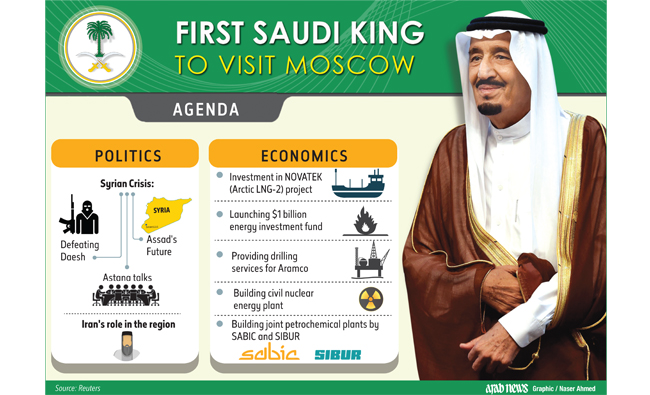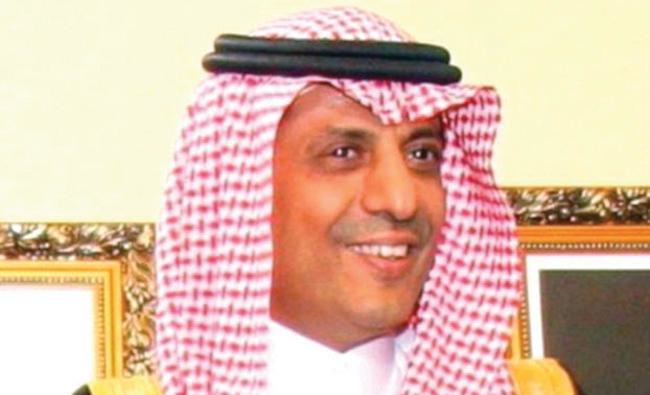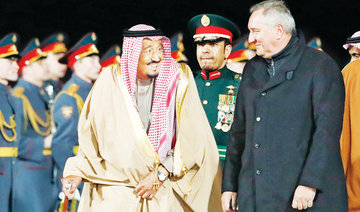MOSCOW: Saudi Arabia and Russia are influential and pivotal countries who can work together to address regional issues, the Saudi Ambassador to Russia said on Wednesday on the eve of King Salman’s landmark visit to Russia.
“Surely this visit will give a great push to the development of relations between the two countries in all fields,” Abdulrahman bin Ibrahim Al-Rassi said. “It is, no doubt, a very important visit, since it is the first by a Saudi king in the history of relations between the two countries that go back many decades.”
The visit was historic in both form and content, Al-Rassi said, and its timing gave it even more importance, amid unprecedented improvements in bilateral relations after visits by Crown Prince Mohammed bin Salman to Russia, and the agreements that emerged during these visits. 
The ambassador said regional and international issues would certainly feature in talks between King Salman and the Russian President Vladimir Putin. “It is natural for leaders of influential and pivotal countries such the Kingdom and Russia to confer, and this will definitely help find solutions for the crises that some regional countries have been facing for the past few years.
“It is in line with the role of the Kingdom, and its incessant efforts, in cooperating and consulting with all parties in order to serve peace and achieve stability and security, especially in a vital and important region such as the Middle East.”
Saudi Arabia and Russia have mutual interests in energy and other sectors, and are the world’s biggest oil producers. Cooperation in this area served the interests of both countries, Al-Rassi said.
“However, cooperation is not limited to a bilateral framework, but rather to a larger framework. And I would like to point here to the historical cooperation between the two countries when they signed the agreement to reduce oil production in late 2016.
“It is no secret that reaching that agreement was due to the vital role played by the leaderships of the Kingdom and Russia. And despite the importance of the oil sector, our cooperation is comprehensively in parallel on all tracks, and we discuss all aspects that may benefit both parties.
“There are many programs and future plans, including a partnership with Russian companies in opportunities that Vision 2030 may offer. We can feel the great interest of Russian businesses to enter the Saudi market, and we urge them to benefit from the chances offered by Vision 2030 to strengthen our partnership.”
The two countries were also serious and committed to the promotion of economic, trade and other relations, Al-Rossi said. “There are clear mechanisms and work teams following up issues in many areas, and their mission is to find the best ways to improve relations. If technical problems arise during the implementation of this or that project, they will be dealt with by these work teams through these mechanisms.
“Work is progressing in parallel on all tracks, and we pay special attention to cultural and educational cooperation because these aspects have special importance in enhancing communication, strengthening relations, and helping both parties understand each other’s culture, especially on the popular level.
“This is exactly what we are working on through the expansion of mutual cultural, literary and educational events, or through communication between official institutions in the two countries.
“And in this respect, I would like to point to the Saudi cultural days organized by the Kingdom during the visit of King Salman to Russia. We will continue our efforts in this direction.”
Two ‘influential and pivotal nations’ can address regional crises: Saudi Ambassador to Russia
Two ‘influential and pivotal nations’ can address regional crises: Saudi Ambassador to Russia

Saudi leadership sends cables of condolences after passing of former Bangladesh PM Khaleda Zia

- Zia died at the age of 80 after a prolonged illness
RIYADH: Saudi Arabia’s King Salman on Thursday sent a cable of condolences to the President of Bangladesh Mohammed Shahabuddin after the passing of former Prime Minister Khaleda Zia on Tuesday.
The king prayed that God have mercy on Zia, forgive her sins, and admit her into paradise. He extended his condolences to the family of the deceased.
Crown Prince Mohammed bin Salman sent a similar cable.
On Wednesday, huge crowds had flocked to the area outside Bangladesh’s national parliament building in the capital to attend the funeral prayers for Zia, who died at the age of 80 after a prolonged illness.
Zia was buried in late afternoon with state honors beside the grave of her husband, a former president who was assassinated in a military coup in 1981, in a park outside the parliament building later Wednesday.














